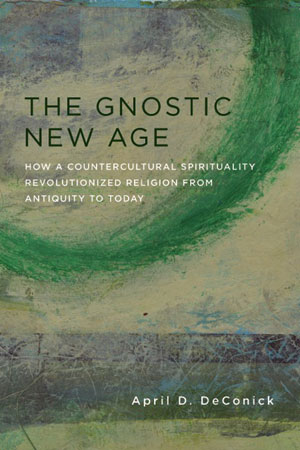
In The Gnostic New Age, I tell the powerful story of how gnostic groups arose in the first century CE as countercultural religious innovators, offering people in antiquity a completely new way to look at themselves, their world, and their gods. I present gnosticism, not as a religion, but as a religious worldview or spirituality that engages multiple religions and affiliations, and remodels them in countercultural ways, producing new religious movements even to this day.
All the religions of antiquity – Judaism, Christianity, and Greco-Roman, Egyptian and Babylonian religions – based their beliefs and practices on a type of spirituality that envisioned human beings as slaves or servants to very powerful and often capricious gods and government authorities who were their deputies on earth. These religions mainly served to keep the world orderly and the gods satisfied and happy, so as to avoid punishments like famine, disease, and defeat in war. People did this by providing the gods with sacrifices that fed them, worship that respected their power, and lifestyles that honored their rules and kept chaos at bay.
Gnostic spirituality interrogated this traditional understanding of religion by turning worship away from the gods of the nations to a supreme transcendent God whom they considered the source of all life. This made the gods of the nations, including the biblical God, lesser deities, even false gods and demons. Furthermore, this transcendent God of worship was not a God that could be described or learned about through some catechism or scripture. This supreme God beyond all Gods had to be experienced by each person or met face-to-face in a mystical embrace. Gnostic groups used rituals they designed to bring about this initiatory experience.
These practices significantly changed ancient people’s understanding of the human being. The human being was no mere mortal according to gnostics. Humans, they thought, contained an actual piece of the transcendent God within them, and they called it the human spirit. This piece of God is what makes humans transcendent, capable of journeying beyond their bodies, beyond their world, to a place of utter Good and Light, which is their source. This journey home and integration with God transforms and empowers the human initiates to externalize the God Within, to become gods on earth, to make their own choices based on conscience rather than obedience to gods and kings.
This meant that religion took on a specific therapeutic function that it did not previously have, to transform and empower human beings as gods, to give humans the power to conquer fate, resist the dominant authorities and traditions, and create a better world for themselves. This reorientation of religion features the rise of the individual and free thinking which became foundational to the history of the Western world and our own history as Americans.
The book focuses on religion and culture in America today, which has taken a gnostic turn beginning in the 1800s. It asks: “If Catholicism defeated gnostic religions in antiquity, how is it that gnostic currents have become so prevalent today?” Gnostics were prolific writers and their lost texts reemerged within modern culture starting in the 1800s. This rediscovery of ancient gnostic literature has resulted in the redistribution of gnostic ideas into American culture and has fed the growth of new religious movements like Theosophy, the psychological program of Carl Jung, and even the New Age movement.
There was a very a productive period in scholarship following the publication of the Nag Hammadi gnostic scriptures into English in 1978, making the gnostic gospels a household phrase. The gnostic gospels were heavily marketed in the 1980s and 1990s as an alternative form of Christianity for Americans disillusioned with traditional denominations, and as a critique of traditional Christianity with its judgmental Father God and concept of original sin.
Think about the hype around films like Stigmata that featured the Gospel of Thomas and the Di Vinci Code that told stories from the Gospel of Philip. This message about the recovery of a lost form of Christianity from antiquity hit home for a large number of Americans who were disillusioned and dissatisfied with the Christianity of their parents and churches that they felt had nothing spiritual to offer.
There is a synergy here, a real audience for gnosticism among Americans who view themselves as free thinkers and people who question authorities, from the church to the government. It was practically love at first sight, so that gnosticism impacted everything from traditional churches to novels to films like The Matrix and Avatar, which help us to think along transgressively gnostic lines about who we really are, where we are from, why we are here, and what our destiny might be. As long as gnostic writings are available for people to read and reflect upon, gnostic spirituality will never go away, but will continue to revolutionize religions of today and tomorrow.
The first page starts with my encounter as an 18-year old college student with the Gospel of Thomas and its unconventional Jesus––an encounter that was utterly transforming for me. It completely rewrote my life, turning me from nursing and the sciences to the humanities, where I would pursue the study of religion and early Christianity in particular.
The last page of the book calls us to consider the implications of the Gnostic God in the modern religious discourse of pluralism and religious tolerance. I write: “Gnostic spirituality encourages us to seek the transcendent, the God Beyond All Gods, as the source of our being. But because transtheism focuses on an ultimate reality that has not been captured successfully in the religions we have created, it gives us a new way to think about ourselves in relationship with one another and to our religions. At the very least it gives us pause to ask why we think our own religion is better than someone else’s, or to wonder why religion perpetuates sexism, racism, and violence alongside more charitable structures” (p. 351).
But my favorite part of the book in terms of my own enlightenment is a section in the chapter “The Pi of Politics” called “Culture and Counterculture in Rome” (p. 280-284). It was when I wrote this section that I realized why Catholicism had triumphed and gnostic groups had not (this is a longstanding question in the field). The answer was not about theology (whose was best) or institutionalization (who did and did not build churches) or conversion (why people converted). It was about which Christians were able to adjust and accommodate their beliefs and practices to Roman sensibilities about religion, a process I am calling the Romanization of Christianity. The Catholics were more successful in this process than gnostic groups who maintained their counterculture orientation and criticism of dominant religious practices.
I am so fascinated with this idea that I am already writing another book provisionally entitled, Deviant Christians: How the Romanization of Christianity Shaped Heresy and the Rise of Catholicism.
I have spoken to many different audiences about gnostic movements and religions and always I am asked what books they can read to learn more about the gnostics. I hope that I have written that book, and that in the process, I have also shown why the gnostic survives in American religion and culture. And why it is so attractive to religious seekers today such as the spiritual-but-not-religious, whose spiritual truth is based on personal experiences of God, human goodness and wholeness, and the desire for spiritual empowerment to change our lives and the bigger world for the better.


April DeConick is the Chair of the Department of Religion and the Isla Carroll and Percy E. Turner Professor of New Testament and Early Christianity at Rice University. She is the co-founder of Gnosis: Journal of Gnostic Studies (published by Brill). Her book, The Gnostic New Age, featured in her Rorotoko interview, won an award from the Figure Foundation for the best book published by a university press in philosophy and religion. She is most noted for her writing on the Gospel of Judas when she challenged the sensationalism generated by the National Geographic Society that wrongly claimed that Judas is a gnostic hero and that his heroics would rewrite our understanding of early Christianity. Instead, her work, The Thirteenth Apostle: What the Gospel of Judas Really Says, shows that Judas remains demonic in the Gospel of Judas, just as he is in the New Testament gospels. She also appeared in CNN’s documentary on the Gospel of Judas that premiered on television in 2015.